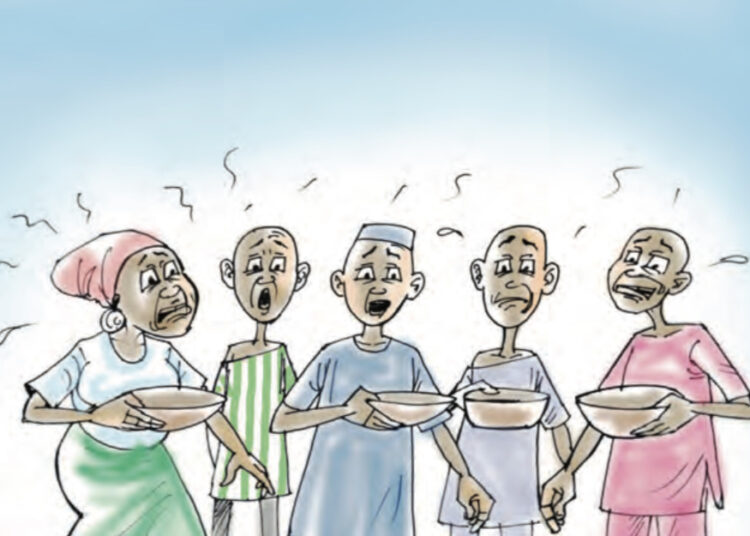With an inflation rate of 28.92%, among the highest in West Africa, Nigeria’s economy is passing through one of its worst phases and the impact on the citizens is very telling. The telltale signs are hunger, starvation and, expectedly, frustration in the land. Save for Sierra Leone which recorded an inflation rate of 52.16% as at the end of 2023, Nigeria’s worrisome inflation figure dwarfs that of Ghana at 23.2%; Gambia (17.3%); Liberia (11.7%); Guinea (9.3%); Niger (7.18%); Ivory Coast (3.9%); Togo (3.5%); Guinea Bissau (3.1%).
Other countries that Nigeria’s worrisome inflation figure shadows are Mauritania with 1.6%; Cape Verde (1.3%); Burkina Faso (1%); Senegal (0.8%); Benin Republic (0.4%) and Mali (-0.5%).
How does Nigeria’s inexcusable and intolerably huge inflation figure of 28.92% affect the common man on the street? Well, it is reflected in the steep and, I must add, continuous rise in the prices of staple food with its worrisome impact on families. The attendant consequence is the growing cry of hunger in different parts of the country. And this must worry us all, especially those in positions of authority.
A story was told of a former governor of one of the northeastern states of Nigeria who was doing relatively well in terms of building infrastructures, including roads, schools and others, with more focus on roads. One day he went for a condolence visit in one of the areas in the state capital and as he was expecting to acknowledge cheers from onlookers along the road, he saw people lined-up with spoons on their hands.
Amazed by the open display of discontentment, the governor was said to have asked his aides what that meant. He was told that the people said they were hungry and that even though they appreciated his infrastructure development efforts, they needed food because, according to them, ‘no be road man go chop’.
Like their compatriots from this unnamed northeast state, Nigerians across the country are presently crying of hunger. While the former northeast governor in the above narrative did relatively well in building infrastructure, the same cannot be said of the present occupant of Nigeria’s presidential villa. Nigerians are lamenting and asking: since there is no infrastructure and no food, where is the dollars?
Growing hunger
But is President Bola Ahmed Tinubu aware that his fellow countrymen are hungry and most of them may succumb to hunger (God forbid), if nothing urgent is done?
In one of his articles, cerebral writer and well-read columnist, Festus Adedayo, referenced an incident that happened during one of President Tinubu’s visits to Lagos State late last year. According to Adedayo, when the president’s convoy drove through one of the streets in Lagos Island, people were heard saying, Ebi npa wa o, translated in English to mean ‘we are hungry’.
Whether the president heard them or not, it is clear that the shout of hunger is not peculiar to those people on the street of Lagos Island on December 29, 2023 when the president visited. It has since become a national cry desirous of urgent attention.
Earlier this week, youths and women from Niger State stormed the streets of Minna, the state capital, to protest the piercing hardship and the skyrocketing cost of living in the country.
The protesters decried the suffering under the present administration of Bola Tinubu, as they lamented how the country’s economy was getting worse. Similar protest took place in Kano, the north’s commercial capital and the second most populous city in the country.
Alarming food price
In the face of this growing hunger, the prices of foodstuffs are gradually hitting the rooftop, with many families unable to afford a decent three meals per day. A recent study by Consumers International and Consumer Advocacy and Empowerment Foundation (CADEF) revealed what we all know: worrying trends in the country’s food pricing landscape.
The study which covers the six geopolitical zones focuses on fluctuations in prices of staple food, specifically yam, garri, rice, beans, chicken and groundnut oil between the months of November and December 2023. It decried a significant change in prices across the value chain.
Sadly, the deplorable state of security, especially rising cases of kidnapping, has scared most farmers from their farm lands. Even though we have arable lands, fertile enough for the cultivation of different food crops that can serve local needs and even for export, most farmers have been driven away from their farms and source of livelihood by kidnappers and other criminal elements who are having a field day. In the face of this worrisome phenomenon, there is an apparent scarcity of food and this is responsible for the skyrocketing pricing.
Unless something drastic is done, we all will have to brace up for more protests because people can endure bad leadership but nobody can endure hunger. And as it is often said, ‘a hungry man is an angry man’.
Lowest cost of living?
Yet, in a move that shows it prefers to live in self-denial, the Nigerian Presidency wants Nigerians to believe that they enjoy the lowest cost of living on the continent. While responding to former Vice President Atiku Abubakar’s lamentation about government’s policies and their attendant consequences on cost-of-living pressures, the presidency claimed a recent comparative cost of living indices showed that Nigerians still enjoy the lowest cost of living in Africa. If at this rate we are enjoying the lowest cost of living in Africa, we still want it lower because as it is, most of our compatriots cannot even withstand it.
When it’s convenient for them, they remind us of some boogie statistics and when it’s unpleasant to them, they ask ‘na statistics we go chop’. How does anyone expect Nigerians to believe that with the biting hardship in the land, they still enjoy the lowest cost of living in Africa? Assuming without conceding that the report is true, why not compare us with other economies our size and that have the sort of resources we have?
APC’s inexplicable response
Curiously, the ruling party has elected to play politics with this whole issue of hunger, claiming in its usual manner that there is a “desperation to portray the All-Progressives Congress (APC)-led administration as under-performing” and accusing the opposition parties of resorting “to instigating unsuspecting young people to protests in the streets of some major cities”.
It was Abraham Lincoln who cautioned that it is better for one to remain silent and be thought a fool than to speak and remove all doubt. The APC cleared our doubts when it issued a stupid statement claiming that the protests in Minna and Kano were the manifestation of a devious and unpatriotic plot of the opposition political parties.
“That the protests happened simultaneously in both cities is not coincidental. It bears a bold stamp of an orchestrated and coordinated effort to instigate unrest and undermine the government. This mercenary opposition tactic is a clear and present threat to public peace and national security,” a statement signed by Felix Morka for the party, claimed.
To suggest that Nigerians, most of whom are feeling the current hardship, need to be instigated before crying of hunger is to suggest that the country is a nation of zombies. Like most Nigerians, I find the APC’s statement very offensive and a deliberate attempt to politicise a very serious matter that affects most Nigerians. There is hardship and more specifically hunger in the land. What Nigerians expect is to see the government doing all it takes to find practical ways of addressing it. Trying to shift blame belittles a party that prides itself as a bastion of progressive ideals.





